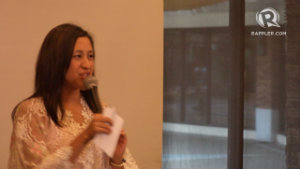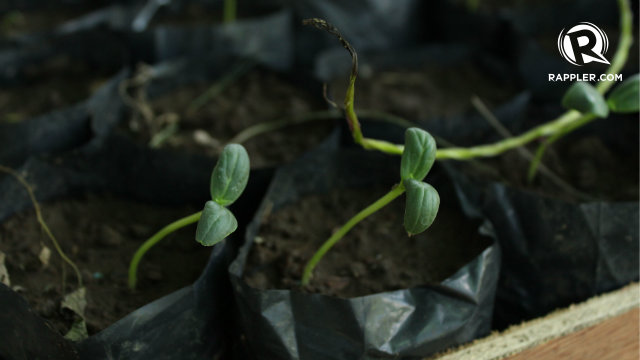SUMMARY
This is AI generated summarization, which may have errors. For context, always refer to the full article.

MANILA, Philippines – The world has 500 days before the end of 2015 and the deadline of the Millennium Development Goals (MDG). What can we do until then?
A lot, according to advocates.
“2015 is a big year. It presents opportunities to engage governments regarding the futures we want,” said Gomer Padong of Beyond 2015 Philippines during the launch of Aksyon/2015 on Tuesday, August 19.
Aksyon/2015 is the Philippine version of Action/2015, an international movement – composed of civil society organizations – demanding that governments uphold their promises. It aims to empower marginalized Filipinos to realize their rights and to discuss the root causes of poverty.
The movement conducts large-scale mass-mobilization campaigns, dubbed “Global Moves for Justice 2015,” to urge leaders and citizens to make use of 2015 as an opportunity for “transformational change.”
Global Moves’ goal is for each country to connect their respective local issues to the global process of shaping the post-2015 agenda and the Sustainable Development Goals (SDG), the MDG’s successor.
The campaign wants people to literally “move” to raise awareness and to demand action on issues of inequality – through flash mobs, arts, music, sports, story-telling, marathons, marches, and other creative public actions.
In Asia, the mobilization is called “iMove for Justice, Peace, and Equality.” In India, for example, people held a march protesting against the caste system.
In the Philippines, the Aksyon/2015 team plans to highlight climate justice by holding a long walk in Tacloban. The team wants Climate Change Commissioner Yeb Saño to discuss climate change in each of the provinces the long walk will cover.
The team also wants to work with the church, in time for the Pope’s visit in January 2015. “We can mobilize within the church to drum up issues of inequality and social exclusion,” said Beckie Malay of the Philippine Rural Reconstruction Movement, and convenor of Aksyon/2015.
The “global moves” will be documented online, hoping to derive stronger impact from the powerful images of united action across the world.
“We will mobilize the marginalized and move together. End goal is to have a global domino effect,” Malay added.
Hunger, governance
Aksyon/2015 sees income inequality as one of the country’s biggest problems, stressing that the country’s “impressive economy does not benefit everybody.”
“One of the weaknesses of MDGs is that it’s not very localized. Citizens weren’t included in the crafting of the agenda,” Padong argued. In achieving the SDGs for 2015-2030, he hopes that the government will have a more localized and collaborative strategy.
The marginalized sectors should be involved in the planning and evaluation of programs, according to Ernesto Ofracio, chairperson of AKTIB, a people’s organization for the urban poor.
To help solve the country’s hunger situation, Ofracio suggests that government engage in more public consultations, provide more subsidy to farmers and fishers, increase wages, and control food prices. “Di nga tayo namamatay sa gutom dahil maraming kumakain ng pagpag. Ang tanong, nabubuhay ba tayo nang may dignidad?”
(We don’t die of hunger since many people eat recycled leftovers. The question is, are we living with dignity?)
Aksyon/2015 also emphasized the need to monitor government budgets. How does a local government unit (LGU), for example, spend its budget for health and nutrition programs?
Malay then urged the government to strengthen policies directly enabling people’s right to food. She observed that some of the country’s existing programs on nutrition are not properly implemented.
“The poverty threshold now is P52 ($1.25). Food provision is around P33. What kind of food can families buy? Today they’ll eat noodles, tomorrow it’s the same? Our challenge to the government is to rethink what kind of food basket the people need in order to survive,” Malay said. (READ: ‘Pinggang Pinoy’)
As one solution, Malay asked the government to support organic farming which can provide both livelihood and food security to poor families.
Creative solutions
Aksyon/2015 sees the importance of engaging both local and national governments in crafting and implementing sustainable development plans. It encourages LGUs to come up with creative solutions to problems like hunger.

“We teach communities farming technologies. Some barangays use idle lands to grow vegetables and have pick-and-pay mechanisms where families can get discounts,” Belmonte explained on the sidelines of the launch.
Quezon City has 84 urban farms at present, and is currently working with Nueva Vizcaya for a “farmer-to-consumer” project enabling farmers to keep a bigger share of their earnings.
Daycare centers and schools among poor barangays are also encouraged to maintain vegetable gardens; the vegetables are then used during feeding programs.
A bill proposing to institutionalize urban gardening across the country’s highly urbanized cities is currently pending.
cities is currently pending.
However, for these agricultural initiatives to work, issues on climate change must also be addressed, according to Francis Dela Cruz of the Climate Action Network.
“Is it true that climate change only affects the poor? No. We’re all affected, however, the poor don’t have shields,” Dela Cruz said. He encouraged LGUs to improve their programs on disaster preparedness and response.
The Philippines, advocates said, is ready to move to the next batch of challenges in 2015 and beyond. Together, Filipinos must move and ensure that no one gets left behind. – Rappler.com
The Aksyon/2015 National Action team members include: ACF Philippines, Beyond 2015 Philippines, Code NGO, CSC-CSD, FSSI, GCAP Philippines, Green Research, Plan International Philippines, Social Watch Philippines, and World Vision Philippines.
Do you have any other creative ideas on how we can raise awareness about issues of inequality and hunger? Send your stories and ideas to move.ph@rappler.com. Be part of the #HungerProject.
* Runners image via ShutterStock
Add a comment
How does this make you feel?
There are no comments yet. Add your comment to start the conversation.